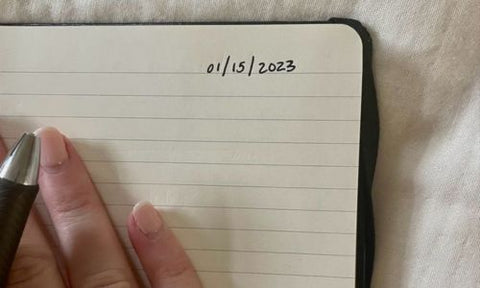
So you've been hearing everyone talk about the importance of doing their “shadow work but have no idea what that means. Is it real? Is it dangerous? Where are you even supposed to start? Don't worry, we've got you covered. Here's what we'll explore:
What is Your Shadow Self?
Your shadow self is the inner part of yourself that you keep hidden. It's where you store all of your innermost pain, shame and trauma. We often repress our shadow selves because deep down we don't want to acknowledge our difficult past, bad decisions or negative qualities.
Carl Jung, the renowned psychologist who came up with this concept stated that; those who keep their shadow self completely separate from their conscious world, have the darkest and most dense shadows. This meaning, the more you repress it, the darker it becomes.
The shadow self is developed between the ages of 0-7. During this time, both hemispheres of the brain are firing as you absorb the conditioning of your families, friends and society like a sponge.
Through this conditioning you develop your personal identity or "Ego", essentially figuring out who you are and how you fit into your world. By the time you're 8, the majority of your belief systems are deeply ingrained in your subconscious mind. This will follow you into adulthood and impact all of your decision-making without you even realising it.
What is Shadow Work?
Shadow work is the practice of connecting with and bringing awareness to the shadow self. The process can be quite confronting as you will inevitably dredge up emotional pain and trauma from your past.
In order to practice shadow work you have to question the subconscious assumptions that you have about yourself and the world. Who are you? Why are you the way you are? What do you think about life; are you grateful, is it a struggle? Why do you feel this way? Delving into the repressed memories of your childhood is a powerful way to access the answers to these questions.
Shadow Work Example
It is the conditioning that you received as a child that is often responsible for self-sabotage, recklessness and self-destructive behaviour. For example, Person A grew up with a very selfish mother.
She always put herself first, never paid them attention and complained whenever they asked for something. By observing their mother's behaviour, Person A grew up with the belief that asking for help was wrong and annoying.
As an adult, Person A struggles to communicate their emotional needs, never asks for help and often feels like a burden to others. Person A may think that this is "just their personality" that they've always been shy and independent, when in reality this behaviour goes back to their childhood conditioning.
Shadow work is the acknowledgement and unpacking of this deep rooted trauma, it is the idea that we can recognise different parts of ourselves and work through them.
Is Shadow Work Dangerous?
The goal of shadow work is to confront your deepest fears, insecurities and repressed trauma. It may not be ‘dangerous' but it can be extremely confronting. The more you've ignored and repressed your shadow self, the darker and harder it will be to work through.
You may even unearth trauma that you didn't know was there. For those who are particularly vulnerable, this can be exhausting, overwhelming and even traumatising. The rewards of doing your shadow work, however can be completely transformative.
You are effectively reprogramming your subconscious mind which will shift your behavioural patterns.
But, this takes time, practice and discipline. Facing your shadow self may lead to a change in your habits, reevaluation of relationships, career and who you are as a person. This can be quite overwhelming at first but will inevitably help you to heal.
Although it isn't dangerous, we do recommend proceeding with caution if you are particularly vulnerable, if you feel overwhelmed at any point please consult your physician.
Signs that You Should Practice Shadow Work
There are many signs that point toward someone needing to practice shadow work. In fact, most of us do. When we refer to 'trauma' we don't mean this in a literal sense (or in the way that we know it in society).
Everyone's trauma is different it can be big T trauma which is what we're familiar with or little t trauma, which are conditions from childhood that have manifested in negative and self-sabotaging behaviour as an adult. Signs that you should practice shadow work are;
- Mental health issues like depression and anxiety
- Negative subconscious chatter: your inner narrative is mostly negative. For example: “F* this, this is too hard, life is unfair, why am I so unlucky, what did I do to deserve this
- Constant stress - even the smallest of inconveniences lead to stress and mental suffering
- Generalised sadness or lack of passion in life
- Feeling stuck and unhappy
- Destructive behaviour; over indulging in sex, drugs or alcohol as a coping mechanism
These are all signs that you're repressing your shadow self. Once you start to practice shadow work you will actively seek to heal these issues.
“Closer examination of the dark characteristics reveals that they have an emotional nature, a kind of autonomy, and accordingly an obsessive quality Carl Jung
Benefits of Shadow Work
Practicing shadow work is basically a form of self-therapy. Once you have a greater awareness of your shadow you will be able to actively work on healing. Benefits of shadow work can be;
- Greater self awareness
- Better control over your subconscious chatter
- Feeling more in touch with yourself
- Healing past trauma
- Improved physical and mental energy
- General sense of calm
- Dealing with day-to-day situations in a healthy way
- Understanding your needs
- Setting boundaries
- Improved relationships with others
- Greater creativity
How to Practice Shadow Work
Now that you are aware of your shadow self and subconscious programming, you might be asking, how are you supposed to practice, how do you identify the problems if you're not aware of them? There are many modalities that can be helpful in practicing shadow work including unblocking your chakras, breathwork and journalling with shadow work prompts. Each of these will help to confront the shadow and get to the root cause of your issues.
1. Unblock Your Chakras
Using the 7 chakra system as a guide for your shadow work is a great place to start. The 7 chakras are the major energy centres of the body. Each has a location on the body and specific emotional frequency.
For example, the root chakra is located at the base of the spine, it is the first chakra and stores emotional energy relating to safety, survival and a sense of belonging. If you're someone who feels anxious, fearful or insecure then this is a sign that you have a blocked root chakra and that work needs to be done in this area.
Doing shadow work in this way will help you to heal the emotional body in order from your most baser instincts to your sexual energy, confidence, the way you receive love, your self-expression and intuition.
2. Breathwork
Breathwork is another powerful modality for your shadow work. Simply put it's the practice of bringing awareness and control to your breath. Ever noticed that when you're stressed or anxious that your breath shortens?
When your breath shortens it signals to the brain that you're in danger, this sets off a number of chemical cascades as the body goes into ‘fight or flight' and prepares for a fight. In the opposite sense, lengthening and consciously controlling your breath signals to the brain that you are safe and calms the body.
This sense of calm activates the parasympathetic nervous system which is responsible for emotional regulation. This activation helps to release any stored emotion in the mind or body. This will help you to access information from parts of the subconscious mind that were earlier blocked.
Techniques like pranayama, somatic, holotropic, shamanic and chakra breathwork are all extremely powerful tools in unearthing trauma and practicing shadow work.
3. Journaling & Shadow Prompts
Getting your thoughts and feelings out onto paper is an easy and efficient way to work through your emotions. Don't underestimate the power of putting pen to paper when practicing journaling or shadow work prompts.
There's something about physicalising your stream of consciousness onto a piece of paper that is extremely powerful. Ask yourself as many questions as you can and use these as prompts to reexamine old belief systems and subconscious programming.
You will reveal things about yourself that you don't even realise as you're writing. It also allows you to review your thoughts, you may look back at a journal from 6 months ago and realise how much you've changed.
Final Thoughts
Although we wouldn't consider shadow work to be 'dangerous', it can be quite overwhelming and confronting. For most of us, the shadow self lives in the deepest parts of our subconscious minds and goes all the way back to our childhood conditioning.
Once we start to practice shadow work we unearth all of the repressed trauma that has remained stowed away for years and sometimes decades. This can be truly challenging, but will ultimately heal and transform your life.



